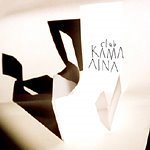
Kama Aina Club Kama Aina
(Rumraket)
I came across a strange little album called Music Activist by Kama Aina on the teeny-tiny Geographic label a couple of years ago. I dismissed it, at first, as one of those post-post-modern ironic jokey things that tend to sail right above my bald pate like clay-pigeons, but then it started to grow on me, and then it became something of a chill-disc regular on tedious and stressful car journeys to exotic places like Tesco and IKEA.
Kama Aina is the solo project of Takuji Aoyagi, who's as near as dammit to a twenty-oughts equivalent of the itinerant troubadour - a traveller first, but incidentally a musician whose music is just a touch more musical than the crusty busker with a dog-on-a-string and a guitar ('just a touch' is sort of a joke - one of those post-post ... oh forget it). Home is Tokyo, where Kama Aina gleams, along with fellow DIY folk-popsters Maher Shahal Hash Baz and Tenniscoats, in that currently ascendant scene, but it's as a rolling stone, gathering only the green moss of musical ideas from other islands such as Cuba and Hawaii ('kama'aina' is Hawaiian for 'Hawaiian', apparently), that his restless imagination has come momentarily to rest here, in the perfectly delightful Club Kama Aina.
Now, don't go all Ren and Stimpy on me just because I said 'delightful' - there actually is a capacity for delight in the human auditory apparatus that doesn't have to be equated with twee and whimsy: admittedly, an adult preference for, say, Keane over Kent should properly be regarded as perverse and pelted with righteous opprobrium. What I'm saying, though, is that the ten-year-old's capacity for musical delight is not something that's necessarily lost in the hormonal rush to maturity - it's just not much catered for in the sex n drugs n rock n roll markets.
Enter Club Kama Aina - a forty-minute sensory holiday from all things tediously grownup on that lost island of childhood memories that we all look back on with more or less delusional nostalgia. It's a bit like what the smell of a favourite teddy bear does, except without the sneezing fit from the dust.
Just because the current epicentre of the childish music movement is in the famously tectonically-challenged Japan doesn't mean that it was ever thus. Far from it. There was a Scottish moment, would you believe, around 1982, when twee pop was born in Glasgow in the form of a single called Songs for Children by The Pastels, a group whose own critically underwhelming presence has nevertheless been profoundly influential on the better-known careers of bands like the Jesus and Mary Chain, Belle & Sebastian, and Teenage Fanclub, inter alia. This was a movement towards wistful whimsy and intentional naïveté that certainly wasn't - and isn't - everyone's cup of tea, but, for whatever reason, its spirit has been wholeheartedly endorsed in Japan, and artists like Kama Aina are absorbing and reinterpreting it in their own inimitable and eclectic fashion, which means, amongst other things, the subversion of the classical taisho goto (Japanese harp) and wood-blocks to some totally hybrid songs that sound like a morris-dancing manga might look.
It's nice - in a re-cyclic sort of way - to see a few of that original Pastels collective turning up on this album as guests: Stephen Pastel himself providing the soft-sung lyrics on the rueful, haunting Millport, Belle & Sebastian founder member Isobel Campbell providing vocals and cello on Millport, Car Song, and Club Kama Aina, and Falkirk jazz legend Bill Wells appearing on piano and accordion on the same three tracks.
Club Kama Aina is released on Rumraket, the two-year-old label run by the effortlessly echoic Efterklang, whose own take on life-affirming intentional naïveté is as unmistakably Danish as Kama Aina's is Japanese. That they should choose to extend the net of cross-cultural influence in this way comes as no surprise after their release, earlier this year, of Human is Music by Cacoy, another bunch of Japanese joy-guerillas whose current high currency is as welcome as it is irresistible.
The sheer unlikelihood of such an artistic alliance (Tokyo - Glasgow - Copenhagen - who'd a thought?) is something that has to be factored into any assessment of its effect. It's the answer to some random bonus music question in a Channel 94 quiz show that never got aired because they ran out of sponsorship. Such accidental cross-fertilisations have been historically responsible for whole divergences of genre - from cajun to swamp pop, bhangra to hip hop - and, just as the cruelly indifferent laws of natural selection apply to organic evolution, so do they operate on cultural crossbreeds, and time alone will tell whether or not all this excitable and exciting musical promiscuousness results in a speciation or an extinction. Meanwhile there's a whole discful of chillin to be done, and I have a feeling this one might last all the way to Sainsbury's.
22 October, 2006 - 19:39 — Paul Roylance